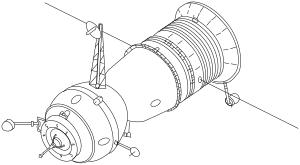Histopathology image classification: Highlighting the gap between manual analysis and AI automation
Contents
 | |
| Mission type | Orbital test flight |
|---|---|
| Operator | Soviet space program |
| COSPAR ID | 1975-106A |
| SATCAT no. | 8430 |
| Mission duration | 90 days, 11 hours and 47 minutes |
| Orbits completed | 1470 |
| Spacecraft properties | |
| Spacecraft | Soyuz 7K-T No.8 |
| Spacecraft type | Soyuz 7K-T/A9 |
| Manufacturer | NPO Energia |
| Launch mass | 6,570 kg (14,480 lb)[1] |
| Landing mass | 2,800 kg (6,200 lb) |
| Start of mission | |
| Launch date | 17 November 1975, 14:36:37 UTC |
| Rocket | Soyuz-U |
| Launch site | Baikonur 1/5[2] |
| End of mission | |
| Landing date | 16 February 1976, 02:24 UTC |
| Landing site | 56 km at the southwest of Arkalyk, Kazakhstan |
| Orbital parameters | |
| Reference system | Geocentric orbit[3] |
| Regime | Low Earth orbit |
| Perigee altitude | 199.7 km (124.1 mi) |
| Apogee altitude | 263.5 km (163.7 mi) |
| Inclination | 51.6° |
| Period | 88.8 minutes |
| Docking with Salyut 4[4][5] | |
| Docking date | 19 November 1975, 16:19 UTC |
| Undocking date | 16 February 1976, 23:07 UTC |
| Time docked | 89 days, 6 hours and 48 minutes |
Soyuz 20 (Russian: Союз 20, Union 20) was an uncrewed spacecraft launched by the Soviet Union. It was a long-duration test of the Soyuz spacecraft that docked with the Salyut 4 space station. Soyuz 20 performed comprehensive checking of improved on-board systems of the spacecraft under various flight conditions. It also carried a biological payload. Living organisms were exposed to three months in space. The primary goal of the mission was to test hardware modifications to the Soyuz 7K-T spacecraft that would extend its operating life from two to three months in preparation for long-duration Salyut crew residencies.
Mission parameters
- Mass: 6,570 kg (14,480 lb) [1]
- Perigee: 199.7 km (124.1 mi)[3]
- Apogee: 263.5 km (163.7 mi)
- Inclination: 51.6°
- Period: 88.8 minutes
Return
It was recovered on 16 February 1976 at 02:24 UTC.[1]
References
- ^ a b c "Soyuz 20". nssdc.gsfc.nasa.gov. NASA. 14 May 2020. Retrieved 18 October 2020.
 This article incorporates text from this source, which is in the public domain.
This article incorporates text from this source, which is in the public domain.
- ^ Mark Wade. "Baikonur LC1". Encyclopedia Astronautica. Retrieved 4 March 2009.
- ^ a b "Soyuz 20: Trajectory". nssdc.gsfc.nasa.gov. NASA. 14 May 2020. Retrieved 18 October 2020.
 This article incorporates text from this source, which is in the public domain.
This article incorporates text from this source, which is in the public domain.
- ^ Anatoly Zak. "The Salyut Era: First Space Stations". RussianSpaceWeb.com. Retrieved 18 September 2024.
- ^ Robert Christy. "Salyut 4". Orbital Focus. Retrieved 18 September 2024.


















